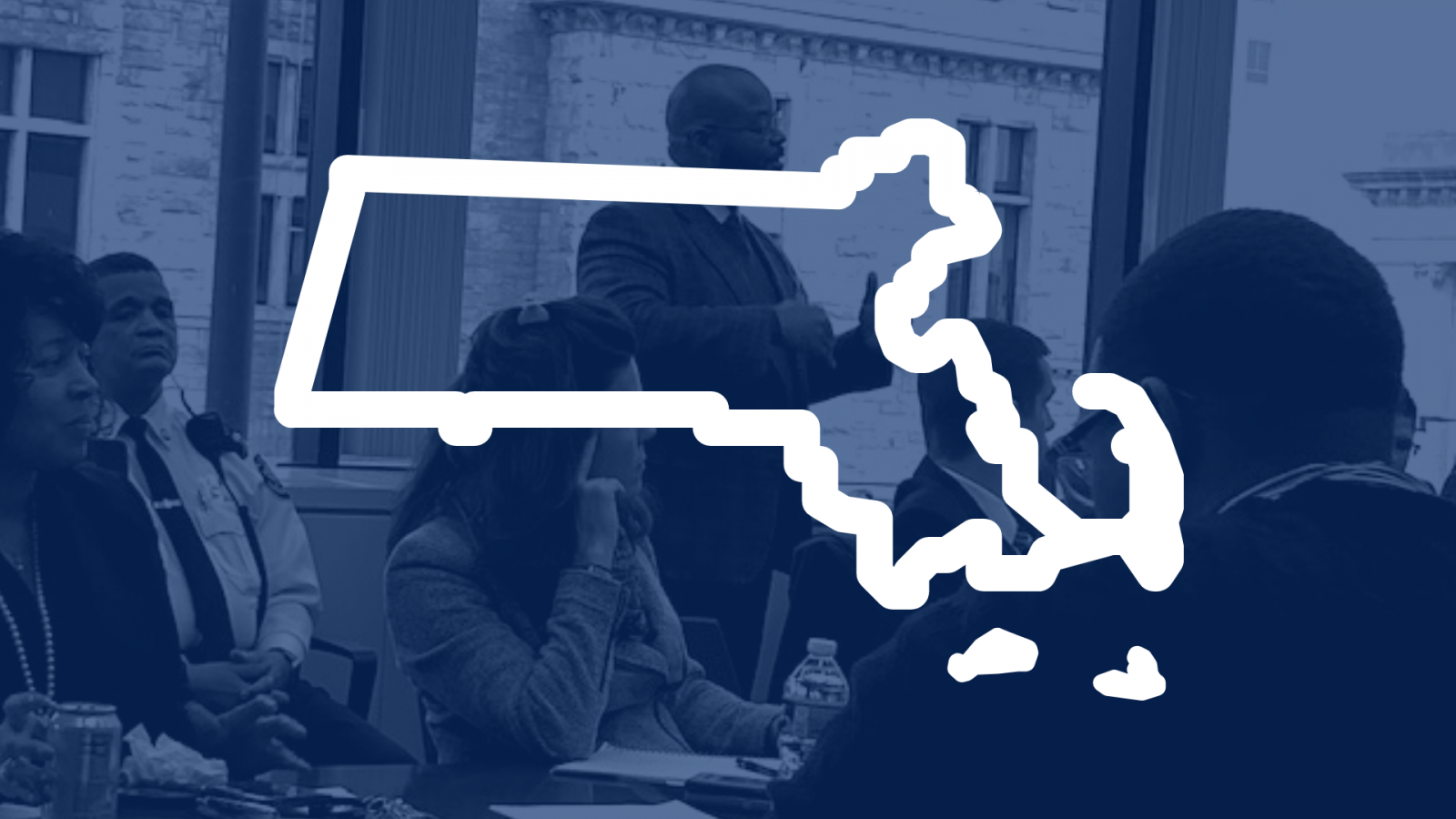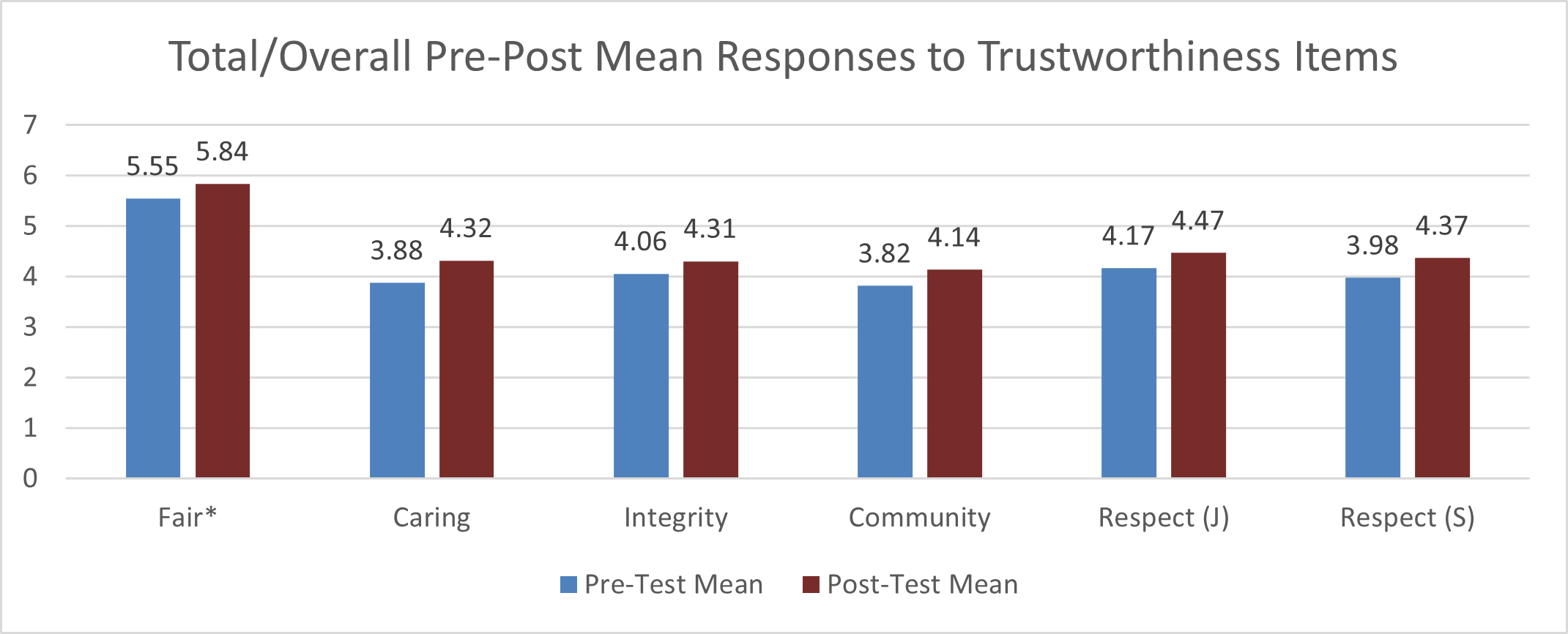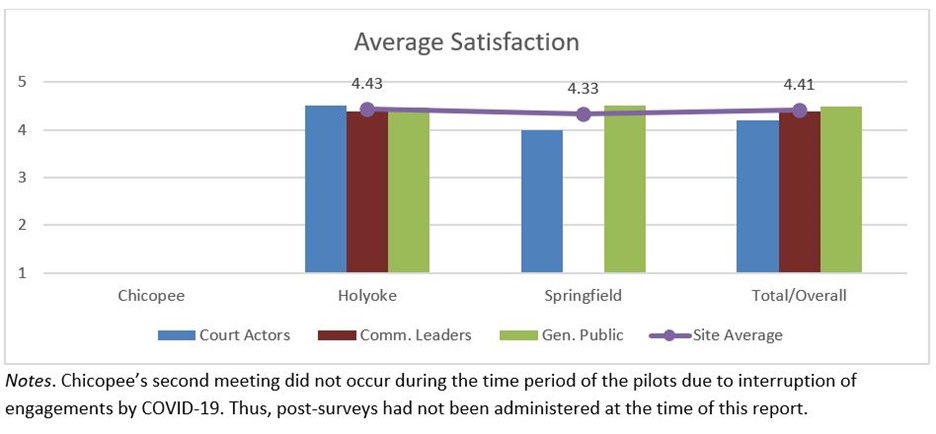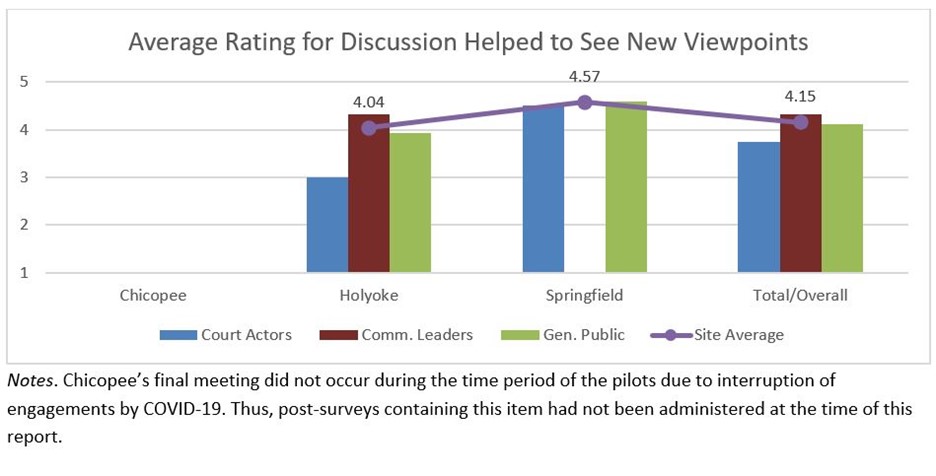
Massachusetts's Approach to Community Engagement
The Massachusetts Trial Court led and coordinated the Massachusetts public engagement project. The Massachusetts leadership team worked to coordinate and convene stakeholder and public engagement events with court actors (e.g., judges, court staff, lawyers) from three local jurisdictions:
- Chicopee District Court
- Holyoke District Court
- Springfield District Court
With guidance and support from the Massachusetts leadership team, partnering court actors developed and implemented community engagement activities focusing on court and community solutions to substance abuse addiction and its justice system implications. Within this broad area, the Massachusetts team encouraged partnering court actors to develop and implement community engagement activities that were most appropriate to local contexts and concerns.
Goals
The Massachusetts team had both overall and community-specific goals.
Overall project goals included:
- Engage community members and stakeholders to identify opportunities for court and community solutions to substance abuse.
- Develop a community coalition to plan future public engagement initiatives focusing on understanding problems pertaining to substance use and generating court and community-based solutions.
Recruitment
Massachusetts team partners used a convenience and purposive sampling approach in each of the three communities to recruit engagement participants.
Engagement Overview and Activities
The Massachusetts team and its court actor partners convened multiple engagement sessions. Two engagements in Chicopee and one in Springfield targeted community stakeholders. An engagement in Holyoke targeted both community stakeholders and members of the general public. All the engagement events focused on addressing court and community solutions to substance abuse issues. Each of the Massachusetts communities designed and implemented their engagement initiatives to fit their local context. Therefore, the size and nature of the engagement activities varied.
Prior to the engagements, the Massachusetts team oriented all partnering court actors and stakeholders to the Massachusetts Trial Court’s strategic diversity plan and other relevant diversity, equity, and public engagement related resources.
The pre-engagement activities provided a framework for each community to develop its specific engagement activities. Different activities were used for each locale. Chicopee and Springfield structured and implemented problem-solving discussions with local stakeholders. Holyoke conducted a community panel discussion open to the public and stakeholders to generate discussion leading to further problem-solving efforts.
Key Findings
Across all three communities, common key findings included the following:
- There is a need for community-oriented, preventative measures addressing substance addiction.
- Barriers to effective treatment include a lack of treatment providers and workforce issues, insufficient tracking and follow-up of individuals with substance use issues, difficulties in serving homeless and transient individuals, and lack of transportation resources.
- Community and court partnerships should find ways to address high rates of co-occurring substance use addiction and mental illness.
Community-specific findings for Chicopee, Holyoke, and Springfield are listed on the pages for each community’s engagements.
Evaluation
The Massachusetts team administered pre- and post-engagement surveys at both the Holyoke and Springfield engagements. Only pre-surveys were administered in Chicopee because the COVID-19 pandemic interrupted plans for a final Chicopee engagement, preventing administration of the post-surveys. A total of 91 individuals completed surveys; however, 51 respondents had pre-data but no post-data. Survey content included items on perceptions and knowledge of local courts and their functions, perceptions of trust in the courts, and opinions about the engagement process.
Across two engagement sessions (Holyoke and Springfield), participants were asked (at pre and post) to rate perceptions of how fairly courts treated different people, how much courts care about problems faced by people, how much courts act with honesty and integrity, to what extent they consider courts a part of the community, and perceptions of how respectful and courteous court judges (J) and staff (S) were to the public. On average, there were positive changes from pre- to post-survey for all items. Chicopee’s second meeting did not occur during the time period of the pilots due to COVID-19. Thus, post-surveys had not been administered at the time of this report.

At the Holyoke and Springfield engagement sessions, the average rating for satisfaction with the engagement sessions was 4.41 on a scale of 1-5, in which 1 = very dissatisfied, 2 = dissatisfied, 3 = neither satisfied nor dissatisfied, 4 = satisfied, and 5 = very satisfied.
Thus, on average, participant satisfaction with the engagement experience was between satisfied and very satisfied.

At the Holyoke and Springfield engagement sessions, the average rating for perceptions of how much the engagement discussion helped people see new viewpoints was 4.15 on a scale of 1-5, in which 1 = not at all, 2 = a little, 3 = some, 4 = quite a bit, and 5 = a great deal.
Thus, on average, participants felt that the engagement discussion helped them see new viewpoints at least quite a bit.

Sustainability
Since its participation in the pilot public engagements, the Massachusetts Trial Court has expanded its public engagement activities through more town hall events, listening sessions, community conversations on race, and virtual/online opportunities. Within each of the three communities, partnering court actors and community stakeholders created committees to continue discussing solutions to substance abuse.
Notable activities to sustain these efforts included:
The Holyoke District Court launched the Holyoke Early Access to Recovery and Treatment (HEART) initiative, a partnership between the court, local treatment providers, and the University of Massachusetts Amherst School of Public Health. The HEART program builds upon earlier engagement efforts. It provides court-involved individuals with the option to meet public health interns in court about substance treatment resources.
The Springfield District Court will continue meeting with community stakeholders from their engagement efforts. The court is expanding its drug court with a new initiative called ‘MISSION-Springfield.’ The court will partner with treatment providers and peer advisors to help defendants with mental health and substance abuse issues through a new $2 million federal grant.
Lessons Learned
- Utilize small group discussions: Opportunities for participation and discussion are increased with small group discussion formats. Smaller-sized groups make it easier for people to voice their opinions and provide feedback.
- Targeted outreach: Focus on recruiting engagement participants from court-involved populations, rather than only community leaders. Promotion and outreach in low-income neighborhoods and among vulnerable populations enhances the discussion with needed voices. Availability of transportation and proximity to bus routes should be considered in planning engagement sessions to increase participation.
- Emphasize problem-solving and local solutions: Involving local court and community actors to lead each jurisdiction’s engagement efforts was a successful way to create buy-in. Framing engagement events around identifying solutions made the discussions appealing and productive for participants.
- Maintain contact information of participants: Keeping track of community members and stakeholders who were interested in or participated in engagement sessions helps facilitate future engagement efforts. Engagement sponsors should maintain lists of interested community members for easy follow-up contacts and future activities.




